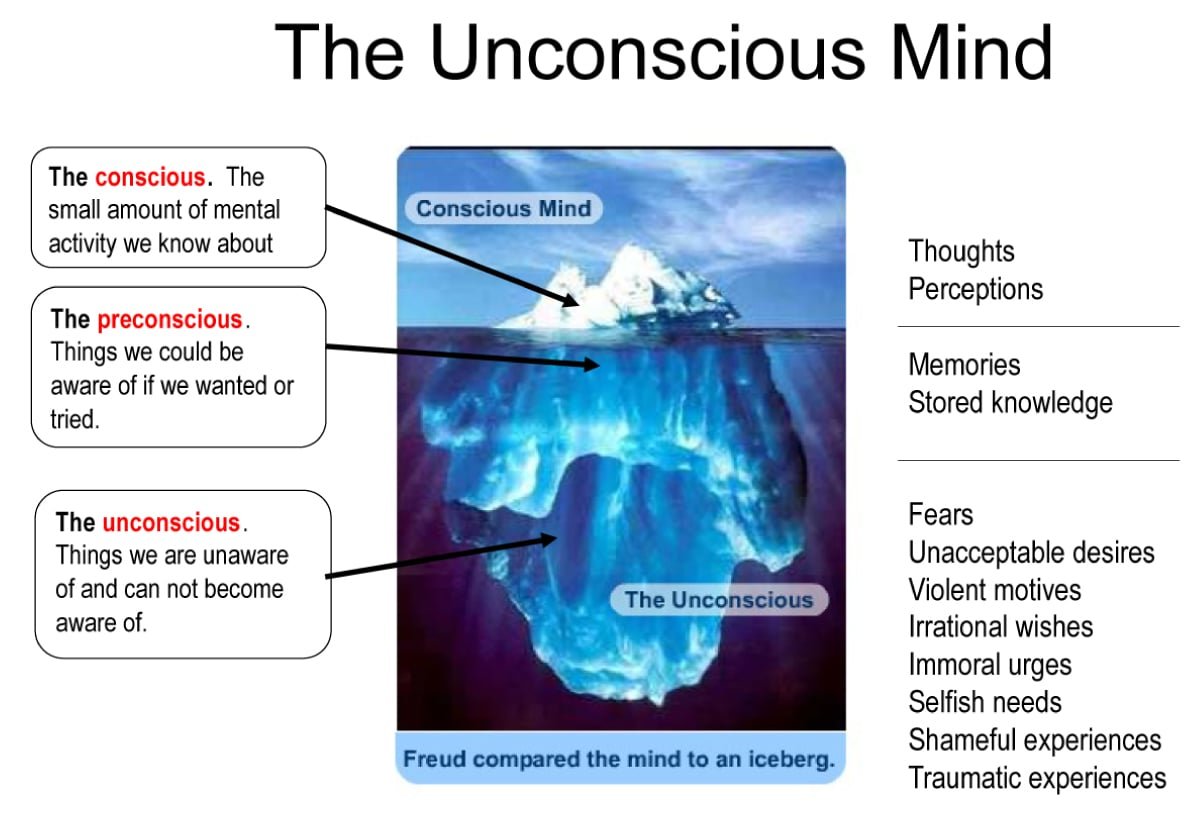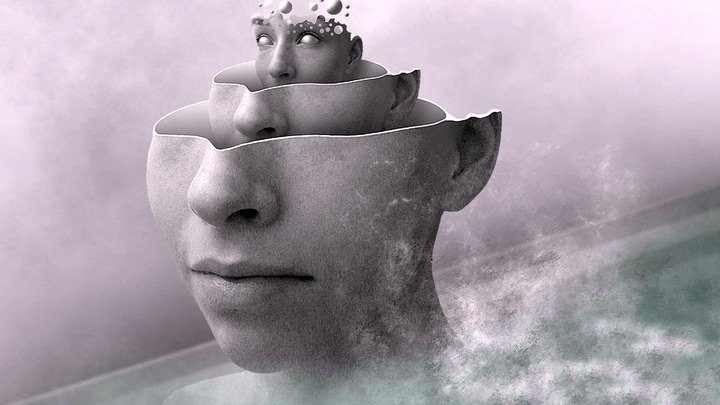That night I dreamt about an abandoned mansion (I dream about abandoned mansions every week... I'm serious), and I was in this huge house with some old people and suddenly one of the old people died, the others who were there embalmed him and he looked like a mummified pharaoh, lying hard on the sofa and one of the other old people who were there insisted that he should lie on top of the mummy to protect it. We tried to convince him otherwise, but to no avail. Other things happened in the dream, but that's just to give you a taste of the madness. And this was a very reasonable dream, not very expressive, but often they are more complex and full of symbolism. My unconscious, like everyone else's, is a chest full of treasures, some brilliant and others so black that they suck the light into themselves and only come to the surface in very specific situations.
 Source
SourceFrom his clinical observations, Freud gradually built up his perception of the Unconscious. He realized that many symptoms that hysterical patients (for example) presented had no clear physiological explanation and seemed to be rooted in emotional experiences that were probably repressed. Freud then considered that the unconscious was a kind of repository of desires, memories and drives that were incompatible with the individual's conscious values, material that the rest of the psychic functioning system kept well guarded because there would be no room for such demands, but which continued to influence behaviour in a subliminal, indirect way and sometimes in destabilizing outbursts.
Freud then defined that our psychic system is divided into three systems: the conscious, the pre-conscious and the unconscious. This model is detailed in his incredible book "The Interpretation of Dreams". It's well worth reading. In a simple summary, the Conscious is where the basic thoughts and perceptions that the individual has of the world around them are found, they are the things that come naturally on a daily basis. The pre-conscious is the intermediate level, where information is accessible but not deliberately present on a daily basis, it requires effort or triggers to activate it and finally, the Unconscious, the depths of the psyche, where repressed desires, traumatic memories and drives are, is practically inaccessible to the individual themselves, even with effort, it will rarely come to the surface without a complex path to be traveled to it. In other words, it's you who needs to go to the unconscious, not the unconscious coming to you.
 Source
SourceFreud noticed certain inherent characteristics of the unconscious that set it apart from the more superficial layers of the psyche. Often the unconscious only appears to the individual during dreams in very specific key situations, and given its complex and transcendent dynamics, certain patterns can be observed, such as the tendency to condense content in dreams, displacements of the individual without causing strangeness and timelessness. In the process of dreaming, we still tend not to see contradictions in the mental stories developed by our mind, just as it is clear that the laws of logic do not operate there. The fascinating thing is that the unconscious becomes more present when all the other layers (the physical body and the "lighter" layers of the individual (consciousness and pre-consciousness) are switched off.
Freud's central theory of the unconscious is based on the concept of repression. Freud described repression as a defense mechanism that keeps unacceptable thoughts and desires out of our daily conscious perception. It's like a system of mental organization and self-defense, but nothing is ever disintegrated. We know very well that we have childhood memories that are still fresh today, sometimes even a dream we dreamed in childhood remains in our memory even after we've grown up, and given that in a way we are "exercising the memory of the unconscious on a daily basis" during the dream state, we will most likely always have them fresh in inaccessible but very up-to-date places. But the unconscious doesn't only present itself through dreams; neurotic symptoms or apparently irrational behavior are pre-conscious representations of the unconscious.
 Source
SourceOf course, Freud didn't just theorize about the unconscious, he searched with great effort, practice and much study for a set of techniques capable of accessing the unconscious of his patients. These are:
Dream Analysis: Dreams are the pavement to the unconscious, every day we are bombarded by a mixture of semiotic, symbolic and fragmented chaos in addition to a vigorous filling of the unconscious.
Free association: Speak uncensored, whatever comes to mind, just let it flow. Normally this doesn't work quickly, but after a certain amount of time freely expressing ideas as they come into the preconscious, you tend to express more things that "seem like they shouldn't even be said out loud".
Interpreting Faulty Acts: For Freud, a faulty act is a kind of failure in the matrix of the anti-unconscious defense system. By saying something unintentionally when you meant to say something else, you may be expressing something that was floating between the layers and needed to come out.
In addition, in Freud's view, the unconscious has a direct relationship with countless psychological problems, especially traumas, obsessions, hysteria, phobias and so on. The idea of psychoanalysis is to bring out these possible triggers of disorder, with the techniques of immersion in the unconscious. In my opinion, the process of immersing oneself and facing the unconscious is a task that human beings should have as an innate responsibility; it shouldn't necessarily be tied to the concepts of psychoanalysis (which ends up indirectly elitizing these searches), but should be encouraged as a natural process for the young adult, the trained adult and the elderly. Knowing oneself in much greater depths than is conventional.
Research sources
- Freud, Sigmund. The Interpretation of Dreams. 1900.
- Solms, Mark. "The Conscious Id." Neuropsychoanalysis, 2013.
- Westen, Drew. "The Scientific Status of Unconscious Processes: Is Freud's View Supported by the Evidence?" Psychological Bulletin, 1999.

Português
Essa noite eu sonhei com uma mansão abandonada (eu sonho com mansões abandonadas toda semana... É sério), e eu estava nesse casa imensa com alguns idosos e repentinamente um dos idosos morreu, os outros que ali estavam o embalsamaram e ele ficou parecido com um faraó mumificado, duro deitado no sofá e um dos outros idosos que ali estavam insistia que deveria ficar deitado em cima da múmia para protege-la. Tentamos convence-lo ao contrário mas sem sucesso. Outras coisas aconteceram no sonho mas isso é só para dar um gostinho da loucura. E esse foi um sonho até que bem razoável, pouco expressivo, muitas vezes são mais complexos e cheio de simbolismos. O meu inconsciente assim como o de todo mundo é um baú entupido de tesouros, alguns brilhantes e outros tão negros que sugam a luz para si, e só saem para a superfície do ser em situações muito específicas.
 Source
SourceA partir de suas observações clínicas, Freud foi pouco a pouco construindo sua percepção sobre o Inconsciente. Ele percebeu que muitos sintomas que pacientes histéricos (por exemplo) apresentavam, não tinham uma explicação fisiológica clara e pareciam estar enraizados em experiências emocionais provavelmente reprimidas. Freud a considerou então que o inconsciente era uma espécie de repositório de desejos, memórias e pulsões incompatíveis com os valores conscientes do indivíduo, material que o restante do sistema de funcionamento psíquico mantinham bem guardados por que não haveria espaço para tais demandas, mas que continuavam a influenciar o comportamento de forma subliminar, indireta e as vezes em rompantes desestabilizadores.
Freud então definiu que nosso sistema psíquico divide-se em três sistemas: o consciente, o pré-consciente e o inconsciente. No seu incrível livro "A interpretação dos Sonhos" esse modelo é detalhado. Vale muito a pena sua leitura. Num resumo simples, o Consciente é onde se encontram os pensamentos básicos e as percepções que o indivíduo tem do mundo ao seu redor, são as coisas que vem naturalmente no dia a dia. Já o pré-consciente é o nível intermediário, onde encontram-se informações acessíveis mas que não estão presentes do dia a dia deliberadamente, exige-se um esforço ou gatilhos para ativa-las e por fim, o Inconsciente, as profundezas da psique, onde estão desejos reprimidos, memórias traumáticas e pulsões, é praticamente inacessível ao próprio indivíduo, mesmo que com esforço, raramente virá a tona sem um caminho complexo a ser percorrido até ela. Em outras palavras, é você que precisa ir até o inconsciente e não o inconsciente vir até você.
 Source
SourceFreud percebeu certas características inerentes do inconsciente que o diferencia das camadas mais superficiais da psique. Muitas vezes o inconsciente aparece para o indivíduo apenas durante os sonhos em em situações chave muito específicas, e dado sua dinâmica complexa e transcendente pode-se observar certos padrões, como o tendência a condensação de conteúdo nos sonhos, deslocamentos do indivíduo sem causar estranheza e a atemporalidade. No processo do sonhar ainda passamos por uma tendência a não ver contradição nas histórias mentais desenvolvidas por nossa mente, da mesma forma que fica claro que as leis da lógica não operam ali. O fascinante é o fato de que o inconsciente se torna mais presente quando todas as outras camadas (corpo físico e camadas mais "leves" do indivíduo (consciência e pré-consciência) estão desligadas.
A teoria central de Freud à respeito do inconsciente apoia-se no conceito da repressão. Freud descreveu a repressão como um mecanismo de defesa que mantém pensamentos e desejos inaceitáveis fora da nossa percepção consciente diária. É como um sistema de organização e auto defesa mental, porém, nada é desintegrado, sabemos muito bem que temos memórias de infância frescas até hoje, as vezes até mesmo algum sonho sonhado na infância continua na memória mesmo depois de adulto, e dado que de certa forma estamos "exercitando a memória do inconsciente diariamente" durante o estado de sonho, muito provavelmente as teremos sempre frescas em recônditos não acessíveis mas muito atualizados. Mas o inconsciente não se apresenta unicamente através dos sonhos, os sintomas neuróticos ou comportamentos aparentemente irracionais são representações pré-conscientes do inconsciente.
 Source
SourceNaturalmente que Freud não contentou-se unicamente em teorizar à respeito do inconsciente, ele buscou com grande esforço, prática e muito estudo um conjunto de técnicas capaz de acessar o inconsciente de seus pacientes. E são elas:
Análise dos Sonhos: Os sonhos são a pavimentação para o inconsciente, diariamente somos bombardeados por um misto de caos semiótico, simbólico e fragmentado além de um recheio vigoroso de inconsciente.
Associação Livre: Falar sem censura, tudo que vier na mente, apenas deixar fluir. Normalmente isso não funciona rapidamente, mas depois de determinado tempo expressando livremente as ideias tal quais elas vem ao pré-consciente, você tende a expressar mais coisas das quais "parecem que nem deveriam ser ditas em voz alta".
Interpretação de Atos Falhos: Para Freud, o ato falho é uma espécie de falha na matrix do sistema de defesa anti-inconsciente. Ao dizer determinada coisa sem querer, quando queria dizer outra, você pode estar expressando algo que estava flutuando entre as camadas e precisava vir a tona.
Além disso, na visão de Freud, o inconsciente tem relação direta com inúmeros problemas psicológicos, principalmente traumas, obsessões, histeria, fobias e assim por diante. A ideia da psicanálise é trazer à tona esses possíveis gatilhos de transtorno, com as técnicas de imersão no inconsciente. Ao meu ver, o processo de mergulhar em si mesmo e encarar o inconsciente é uma tarefa que o ser humano deveria ter como responsabilidade inata, não deveria estar presa necessariamente aos conceitos da psicanálise (que acaba por indiretamente elitizando essas buscas), mas deveria ser incitada como um processo natural do jovem-adulto, do adulto formado, do idoso. Conhecer a si mesmo em profundidades muito maiores do que se tem como convencional.
Fontes de pesquisa
- Freud, Sigmund. A Interpretação dos Sonhos. 1900.
- Solms, Mark. "The Conscious Id." Neuropsychoanalysis, 2013.
- Westen, Drew. "The Scientific Status of Unconscious Processes: Is Freud's View Supported by the Evidence?" Psychological Bulletin, 1999.


